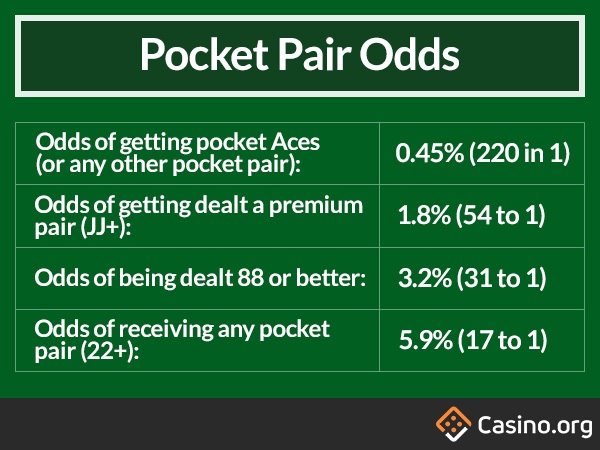So you’re heads up at the end of a long tournament, after playing for quite a while you have developed a pretty good strategy for playing your pocket pairs, such as limping, pushing, check raising, trap tactics etc.
You find that your pockets tend to lose quite often, you are quite frustrated by this fact.
If only there was a way to reduce the odds against you when you are playing your pocket pairs!
Well there is, in fact a way to do that!
Did you know that you actually have a slightly better than average chance of winning when you are playing your pocket pairs in a heads up match?
Statistically, this is so true, that you will have a better than half chance of winning heads up when you are playing your pocket pairs.
You know, the real odds are that you will slightly better than half the time, slightly less than half the time, and no one knows the exact percentage in which it will happen, but you can work with what you know.
You can also use your knowledge of opponents, and your read on what they will do in given situations.
If you opponent calls you with Ace King, the strong possibility is that he has a better kicker, a better pocket pair, or a better suited ace or king.
Similarly, if you opponent raises you, the strong possibility is that he has a good hand, a strong bluff, or a read on your gambling style.
In any case, the fact that you know the statistical odds, the fact that you can make an educated guess as to the probability a particular hand will be better than your pocket pair, and the fact that in the event you do lose a hand to an all-in bet your opponent would still likely have a better hand than you, is a sufficient basis for calling the all-in bet.
That is, in heads-up play, if you make a small raise, or call an all-in bet, on the flop or turn, there is a 99% chance your opponent did not hit the board. The only exception being, perhaps, if you put your opponent on a small pocket pair.
However, if you know that your opponent is a very tight or aggressive player, it is generally more profitable to call an all-in bet on the flop or turn than to call a bet on the turn because, although the all-in bet will be larger, the post-flop pot will be larger.
This does not work for mediocre players. Avoid this move if your opponent is a calling station or a calling Bocoran Rtp Live Hari Ini.
Statistically speaking, there is a 97% chance your opponent did not hit the board in the previous hand, the only exception being if the board ended up 22-80-22. Nothing guarantees your opponent did not hit that board.
Why does this move work? As you might expect, it works because every time your opponent calls you, you are bringing one in your pocket pair, and thus are in the running to win one of two pots.
In poker, there are only two possible outcomes based on where you draw to the river: you win the entire pot, or your opponent wins the entire pot. Neither of these two possibilities is superior to the other. Calling in poker post-flop is an instant call, regardless of whether you hit your card or not.
Just as a quick aside, there are situations where you will want to call all-in, and there are situations where you will want to fold your poker hand. For instance, you may be up against one of the maniacs at the low blind. You may feel your hand is hopelessly defeated, yet you have to take a chance at winning the pot, so you call all-in.
Generally, a post-flop all-in will drive out most, if not all, of the limpers. The small blind may stay in the game, in which case you will not gain any information. You may unnecessarily spend your time limping to see low blinds raises, when there are better opportunities to play the high blinds. In short, when you are a poor poker player, unfortunately there are only two possible outcomes to a post-flop all-in bet: you win or you lose.
What this move does is lay down a cheap look-see bet in case your opponent had a hand of his own. You do not get the sense that you are up against a monster hand when your opponent forces the all-in; rather, you are shooting at a fish, so to speak. As a result, the majority of the time your opponent will have a real hand to match your rags.



